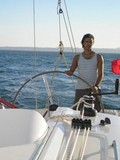Bilateral Meetings
- Morning slot (10h-13h)
- Afternoon slot (14h - 17h)

I am a coastal oceanographer researcher, presently working at the Centre for Marine and Environmental Research (CIMA) of University of Algarve (Faro, Portugal), under a post doctoral program on tidal energy. I have been using both analytical methods and Delft3D Flow model to evaluate the tidal energy resource and individualise the best locations to place Tidal Stream Turbines. Next step of my research is to implement and calibrate the model by including the TST properties combining computational fluid models (CFD) with large scale numerical models using a momentum source approach; and perform model simulations using different hydrodynamic settings in order to evaluate the impacts that energy extraction will have on the temporal and spatial changes of the flow.
Country: Portugal
Organization Type: University/Research
Organization Size: 250+
Areas of Activities
Tidal and wave energy
Real flow and Wave measurements
Detailed flow and measurements using both acoustic doppler profilers and pressure transducers. Setting up hydro-morphodynamic models (Delft3d) to predict the energy resource potential and impact of marine renewable projects.
- Research Co-operation
- Technical co-operation
Monitoring a Real Deployment
OceanFlow Energy (OE) technology will be deploying in the second semester of 2014 a floatable TST on UK waters representing a unique opportunity to collect real data. My aim is to measure the changes caused by operating TSTs on the current-wave interaction with the bed at these real site to: (1) validate the models and accurately quantify the long-term environmental impacts related with the extraction of energy (impact: develop mitigation actions); (2) export the acquire knowledge to the scientific/industrial community and to Portugal (impact: contribute for the development of new design concepts / mooring schemes).
The main goal of the present proposal is the maximisation of energy extraction with minimal associated environmental risks using in situ measurements of pilot-scale tidal energy turbines. Questions are (1) how to improve efficiency of TST in energy production? (2) how much energy extraction ecosystems can tolerate? Clarifying these issues is essential to reduce technology uncertainty and boost tidal energy usage. To achieve this goal and answer the main questions the following tasks will be performed:
1) Collect high frequency data from real deployments my mean of a holistic monitoring programme.
2) Determine the drag coefficient of the turbine under different flow regimes and/or extraction quantities to evaluate changes on flow-bed interaction.
3) Validate the inclusion of turbines on hydro-morphodynamic models and knowledge transfer for future project implementations on coastal systems in terms of impacts on the flow and sediment transport patterns.
4) Design a new TST based on micro-generation principles for R&D purposes of a new Marine Renewables Research Group, fostering future collaborations with researchers/industry.
- Research Co-operation
- Technical co-operation
- Research Co-operation
- Technical co-operation
- Investment/Financing

